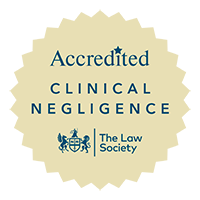Top ranked cerebral palsy claims lawyers

The Healthcare Safety Investigation Branch (HSIB) extends its remit this month to investigate certain types of maternity incidents, including intrapartum stillbirth, early neonatal deaths, perinatal maternal deaths and severe brain injuries in babies born at 37 weeks or later gestation in England after 1st April 2017.
HSIB has been operating since April 2017 and was set up to improve safety through effective and independent investigations. Although funded by the Department of Health (DoH) and overseen by NHS Improvement, HSIB claims to be operationally independent from the NHS and other regulatory bodies, a position which will be secured by legislation that is currently going through Parliament.
To date, HSIB’s remit has been to investigate up to 30 healthcare safety incidents each year, to provide safety recommendations and share learning across the NHS without apportioning blame or liability. The DoH’s 2016 consultation, Providing a ‘Safe Space’ in Healthcare Safety Investigations, highlighted the poor standard of some NHS safety investigations and lack of confidence amongst both patients and NHS staff that ‘safe space’ in investigations in a local (ie NHS Trust) setting would be used properly or fairly. The safe space framework was limited to HSIB’s higher level investigations, a move which the DoH hoped would allow HSIB over time to build up trust in creating a learning culture and demonstrate leadership, earning its credibility by proving its ability to do the job well.
In November 2017, Jeremy Hunt, Secretary of State for Health and Social Care announced in the new National Maternity Safety Strategy that from April 2018 HSIB will extend its reach to investigate around 1000 maternity safety investigations. The changes will affect local NHS organisations at different times as the new programme is rolled out between now and April 2019. In the meantime serious incident and maternity safety investigations will be carried out locally, in the usual way.
HSIB’s stated aim is for the new investigations to bring a standardised approach to maternity safety investigations, maintaining the focus on learning and not attributing blame. Following the alarming but, sadly, not surprising findings of the RCOG’s Each Baby Counts report that parents were not included in 66% of local investigations into maternity safety incidents, HSIB state that involvement of the family in the investigation process will be a key priority.
Once the incident is reported to HSIB and the criteria for investigation are met, multidisciplinary teams of investigators, including experts in obstetrics, midwifery, neonatology and anaesthetics will investigate and report on the causes, contributory factors and safety issues arising from the incident. Their investigation will be informed by consideration of relevant documents, interviewing the healthcare staff involved and talking to the patient’s family. The investigation will consider the physical and emotional impact on the patient and their family, the effect of the safety issues within local and national maternity services, and the wider systemic risk arising from the identified issues.
HSIB hopes to apply its experience as a national investigator to identify and share learning from individual local maternity safety incidents across the entire NHS. Variations in the way health organisations address safety issues will be considered as a means of sharing improvement – a technique that has proven effective in the work carried out by the GIRFT programme.
Interim bulletins may be released to share important recommendations and actions whilst investigations are continuing. Patients and their families will then be given the opportunity to review the draft report and provide feedback and input before the final report and safety recommendations are issued. The draft report will also be shared with the NHS organisation where the incident took place. Thematic reports identifying issues and recommendations but not individual cases or organisations, will be published on HSIB’s website.
At Boyes Turner our cerebral palsy and birth injury specialists have long shared our clients’ frustrations at the inadequacy of local, maternity safety incident reporting through the NHS Complaints Procedure and the Serious Incident Framework. Our clients have suffered lifelong, devastating disability as a result of negligent midwifery, obstetric, and neonatal care and whilst nothing can truly alleviate or repair the damage that these events cause to the patient and their family, disingenuous and superficial investigations of those events which fail to address the true cause of the injury only add insult to injury, increasing our clients’ pain and distrust.
For HSIB to earn its credibility as a leading investigator and contributor to improved maternity safety, it will need to demonstrate its commitment to patient engagement, a willingness to listen and learn from their experiences and an unflinchingly open and honest approach to the investigation and identification of the causes, at all levels, of each patient’s devastating and life-changing injury.
Boyes Turner welcome all genuine efforts to improve safety within maternity services and remain committed to recovering the highest level of compensation for those who have suffered severe injury from deficiencies in care.
If you are caring for a child with cerebral palsy or who has lost their mother in childbirth contact our specialist solicitors by email at cerebralpalsy@boyesturner.com.
They have a great deal of knowledge and expertise, and client care seems to be their top priority.
Chambers Guide to the Legal Profession
Contact our expert Cerebral Palsy solicitors today for support with your claim




